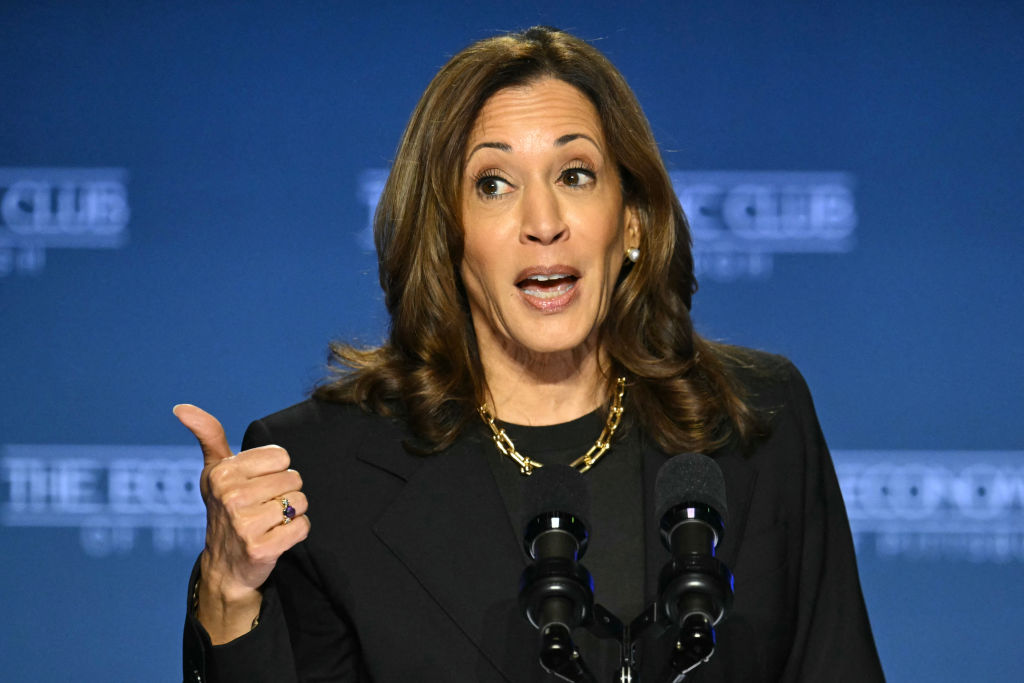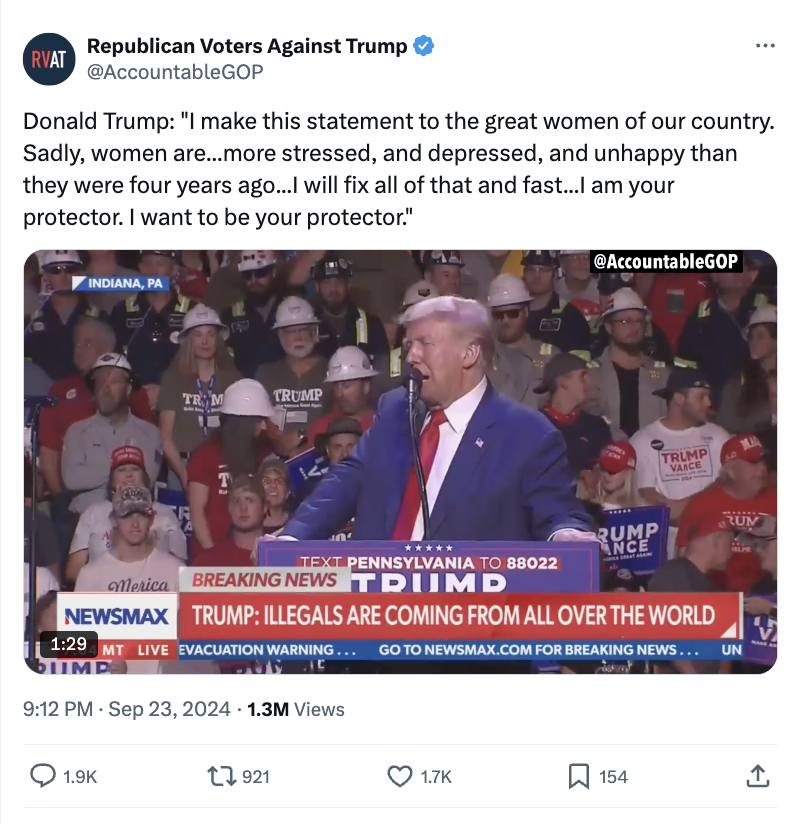Joe Manchin was furious.
“Shame on her,” the senator from West Virginia said Tuesday of Kamala Harris. “She knows the filibuster is the Holy Grail of democracy. It’s the only thing that keeps us talking and working together. If she gets rid of that, then [the Senate] would be the House on steroids.”
His anger had been piqued by a comment Harris made earlier in the day during an interview. “I think we should eliminate the filibuster for Roe,” she told Wisconsin Public Radio, “and get us to the point where 51 votes would be what we need to actually put back in law the protections for reproductive freedom and for the ability of every person and every woman to make decisions about their own body and not have their government tell them what to do.”
There’s a lot about that that’s strange. For instance, since when does Kamala Harris do interviews?
But it’s also strange on the merits. Not so long ago, as a member of the Senate, she pledged to oppose eliminating the filibuster if the Republican majority at the time got any funny ideas.
Even stranger, her strategy as a presidential candidate to this point has been to make vague centrist-y noises on policy while selling herself to Trump-leery voters as a “guardian of norms,” as Philip Klein put it. Yet here she was on Tuesday undermining both elements of that pitch by calling for an end to the 60-vote threshold to pass legislation in the Senate for the sake of codifying abortion rights.
It turns out that Kamala Harris can be quite specific on policy and quite radical on “norms” when she wants to be.
Manchin spent the first two years of Joe Biden’s presidency fending off progressive demands to nuke the filibuster, believing that simple majority rule in the Senate would mean the end of bipartisan compromise. Fellow Democrat-turned-independent Kyrsten Sinema shared that belief and accordingly shared his disdain for Harris after her comments circulated on Tuesday. “To state the supremely obvious, eliminating the filibuster to codify Roe v Wade also enables a future Congress to ban all abortion nationwide,” Sinema tweeted. “What an absolutely terrible, shortsighted idea.”
Terrible, shortsighted—and politically foolish, perhaps, if the two most celebrated mavericks in the Senate are any indication of centrist opinion nationally. Manchin now says he won’t endorse Harris for president.
Has she made a terrible mistake?
The threat from the left.
Sinema is right, of course, that any law that passes the Senate by a simple majority can also be undone by a simple majority. A Democratic chamber that enacts federal abortion rights with 51 votes has set the table for a future Republican chamber to restrict abortion rights with 51 votes. In theory.
But that’s not an argument that will deter Democrats. After all, they know public opinion is on their side on this issue. Codifying Roe would be less politically risky for liberals than limiting abortion access would be for conservatives. You can imagine Harris reading Sinema’s tweet and thinking, “The GOP’s going to ban abortion? I dare them.”
The subject is so favorable for Democrats, in fact, that some might view Sinema’s point as a reason to follow through on nuking the filibuster. The left would love to frighten American voters every two years with the prospect of abortion rights going poof if Republicans return to power. They’d make every federal election a referendum on Roe if they could. A 51-vote threshold in the Senate to legislate on this issue would make that easier for them.
The political problem for Harris in wanting to nuke the filibuster for Roe isn’t how the right will take advantage of it, it’s how the left will take advantage of it if she’s elected.
There’s no logical reason why an exception to the 60-vote rule should be made for abortion but for nothing else, and progressives will be quick to press that point on the new president. Once the filibuster has been waived for Roe, Harris’ base will demand to know why it shouldn’t be waived for a thousand other leftist priorities. Why not for Medicare for All? Why not for the Green New Deal? Why not for a voting-rights mega-bill on the order of H.R. 1?
That would become a political nightmare for the new White House. Vulnerable Democratic senators would be left with nowhere to hide on progressive policy priorities; leftists would feel disenchanted when their big-ticket wish list failed to pass; and the right would be galvanized by the ambitions of the left’s agenda, especially after the bait-and-switch of Harris campaigning for president as a moderate.
You can’t be “half-radical” in ending the filibuster, hoping to nuke it for abortion rights and only for abortion rights, but it’s characteristic of Harris’ approach to this campaign that she would try. She’s aiming to propel herself over the finish line in November with a series of carefully selected popular panders and hoping that voters will otherwise overlook her deafening silence on most other issues. What the Harris agenda might look like post-filibuster apart from abortion isn’t a question she wants you asking yourself, and certainly not one she wants to answer.
So why raise the prospect of nuking the filibuster at all and risk spooking the centrist voters and Nikki Haley Republicans whom she’s eager to woo?
The answer, inescapably, is that she believes there’s more to be gained than lost at the polls by doing so.
Abortion is different.
Klein is right when he says that, for centrists, Harris’ argument against the filibuster is actually an argument to support downballot Republicans this fall. Without the 60-vote threshold in place in the Senate, the only way the GOP will be able to keep the new president in check is if it enjoys an outright majority in one or both houses of Congress.
Conservatives who want to see Trump defeated but don’t want progressivism to run rampant are logically now compelled to support right-wing governance in the upper (and/or lower) chamber. That’s not a message Harris should want to send!
She has two aces up her sleeve, though. One is that most Americans pay no attention to congressional process and won’t be thinking about the repercussions of ending the filibuster when they go to vote. Many couldn’t tell you what the filibuster is, I’m sure. If you’re thinking three moves ahead, like Klein is, then Harris wanting to ditch the 60-vote rule for abortion is hair-raising. If you’re thinking half a move ahead, like most voters do, her wanting to pave the way to bring back Roe as federal legislation simply sounds like a good idea.
Which brings us to the other ace: From the start, the one great exception to Harris’ strategic M.O. of ambiguity and moderation on policy has been abortion. She knows the polls strongly favor Democrats on that issue, she knows she needs to run up the score with women and younger voters to beat Trump, and so she’s willing to be bolder on the subject of reproductive rights than she is on any other topic. If she could make this race a pure gut-check on Roe, she’d be elated.
Prominent Republicans have given her further reason to be aggressive on abortion with their tone-deaf comments about women. J.D. Vance, for example, has never fully recovered from the old “childless cat lady” comments that haunted him in his first weeks as the GOP’s vice presidential nominee. Bernie Moreno, the Republican candidate for Senate in Ohio, complained a few days ago about suburban women being “single issue voters” and urged those who are menopausal to worry less about a subject that no longer concerns them.
Then, at a rally in Pennsylvania, a man who’s been accused by dozens of women of sexual misconduct and who was found liable for sexual abuse just last year uncorked a soliloquy that came off as creepy and paternalistic even by the usual authoritarian standards:
Populist Republicans are handing Harris a “war on women” message on a silver platter. Meanwhile, Trump’s own centrist panders on abortion have put pressure on the Democrat to distinguish herself on the issue by tacking further to the left. Calling for ending the filibuster and codifying Roe is her response to both developments: As the gender gap becomes a gender canyon, Harris seems to believe she’ll net more votes than she’ll lose by being radical about reproductive rights.
I’m not sure she’s wrong. And the more likely it becomes that Republicans will recapture the Senate this fall—which is already very likely and getting likelier by the moment—the less this gambit should hurt her with voters who, like Klein, are thinking a few moves ahead. Those who follow politics closely will soon realize that her party won’t be in a position to nuke the filibuster on abortion or on anything else during her term as president; those who don’t follow politics closely will cheer “bring back Roe!” and not give the subject a second thought.
So what’s the electoral downside of this pander for her, exactly? Seems to me it’s just another popular empty promise that might give her an edge on Trump.
Who’s worse?
If there’s a downside to Harris’ filibuster position, it’s that it will make it easier for Trump to convince undecided voters that she, not he, is more likely to pursue dubious power grabs as president.
That’s not true, but Democrats have given centrists cause to worry. Court-packing, statehood for Washington, D.C., and now tinkering with the 60-vote threshold to move a left-wing agenda are all theoretically on the menu if Harris’ party ends up with control of Congress, never mind that the first two and possibly the third are unlikely to have 51 Democratic votes in favor.
Given the near-certainty that Republicans will control the Senate, though, voters should worry more about what Trump will do with total control of government than what Harris might.
It’s an article of faith among partisan conservatives that if a President Trump calls on the Senate GOP to end the filibuster—which he’s done before, by the way—they’ll laugh him off and say no. Many Republican leaders in the chamber are leery of the idea, and if the party ends up with a bare 51-seat majority, it’s a cinch that Susan Collins and Lisa Murkowski will block any nascent attempts.
But what if the majority is 52 seats or more?
Maybe the John Thunes and John Barrassos of the chamber will be true to their word and tell the newly reelected president to pound sand, but since 2016 the Republican establishment has trended steadily toward greater obedience. Depending on how things go in November, that trend might plausibly accelerate. If Trump overperforms and wins the election comfortably, how courageous can we realistically expect Republicans in Congress to be about resisting his agenda?
What if he comes to them requesting support for some central priority of his campaign, like more resources to carry out a mass deportation program? Senate Democrats would surely filibuster that; Trump would then howl that they’re thwarting the will of the people and demand that the 60-vote threshold must be eliminated immediately.
If you have faith that Thune and Barrasso will remain unmoveable under intense pressure from Trump’s feral base to purge the foreign infiltrators, that makes one of us.
Then again, Senate Republicans don’t need to cave in order for Trump to move his agenda. The way much of his second term will work, I expect, is that he’ll make a half-hearted concession to constitutional process by asking Congress to pass legislation; Republicans won’t be able to find 60 votes for it in the Senate and then Trump will decide that, actually, he can do everything he wants to do under his own executive authority. No need to end the filibuster. The legislature simply won’t matter.
He wouldn’t be the first president to take a more expansive view of one of his powers after being told no by Congress but he might be the first to do so comprehensively. He’s not coming back to Washington and staffing up with slavish cronies only to twiddle his thumbs in the Oval Office in frustration while waiting for the Senate to act. Just listen to him:
That’ll be his attitude with respect to his entire agenda. Congress can assist him in doing what he wants to do or Congress can get out of his way as he goes about doing what he wants to do, but one way or another, he’s going to do what he wants to do. Having the legislative branch come along would be nice for appearances’ sake but ultimately it’s neither here nor there.
And most Senate Republicans will be fine with that. A conference that wouldn’t convict Trump after he incited an attack on the Capitol isn’t going to go to war with him over his power to impose tariffs, particularly knowing which side of that war their constituents would be on.
Saying “Trump would be worse” is setting too low a bar for Harris, though, however true it might be. I hope she thinks better of her filibuster ploy after the election, not just because abortion is properly an issue for the states but because a party faced with an opponent as menacing as the New Right has a civic duty not to make American voters more comfortable with norms-smashing than they’ve already become. Democrats should govern cautiously and judiciously and have faith that they’ll be rewarded for it in elections by the American center until the populist threat has passed.
And if you happen to share that faith, well, that too makes one of us.












Please note that we at The Dispatch hold ourselves, our work, and our commenters to a higher standard than other places on the internet. We welcome comments that foster genuine debate or discussion—including comments critical of us or our work—but responses that include ad hominem attacks on fellow Dispatch members or are intended to stoke fear and anger may be moderated.
With your membership, you only have the ability to comment on The Morning Dispatch articles. Consider upgrading to join the conversation everywhere.